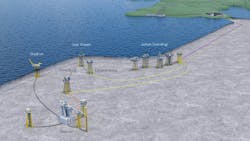More Utsira High area fields to receive power from shore
Offshore staff
STAVANGER, Norway – The Utsira High area power grid, which is expected to become operational in 2022, will provide power from shore to the Johan Sverdrup, Edvard Grieg, Ivar Aasen, Gina Krog, and Sleipner fields.
Originally planned for four fields – Johan Sverdrup, Edvard Grieg, Ivar Aasen, and Gina Krog – the area’s license partners have agreed on maximizing the use of power from shore to the Utsira High area by enabling partial electrification of the Sleipner field center as well.
With the extension of the area solution, an additional six fields will receive power through the Utsira High area solution: Sleipner, Gudrun, Utgard, Gungne, Sigyn, and Solveig.
According to Equinor, the overall area solution will contribute to an average annual reduction in CO₂ emissions by about 1.2 MM metric tons.
Based on the result of recent negotiations by the license partners, the Sleipner field center, together with the Gudrun platform and other tie-ins, will receive power from shore to meet parts of their power demand. Further cuts in emissions from Sleipner and tie-ins are estimated at more than 150,000 metric tons of CO₂ on average per year, according to Equinor.
The Sleipner field center solution calls for Sleipner to lay a power cable to the Gina Krog platform, which will be connected to the Utsira High area solution by a separate power cable by the end of 2022. In certain periods the field’s power from shore demand may exceed the capacity of the area solution. In such periods Sleipner will use gas turbines to cover its shortage.
The industry’s NOx Fund provides up to NOK430 million ($47 million) to realize the partial electrification of Sleipner and tie-ins.
The Sleipner license partners are planning to make a final investment decision during 2Q 2020.
This solution will also ensure that the Lundin Norway-operated Edvard Grieg platform will be able to fully meet its power demand through power from shore. It is expected to reduce annual emissions from Edvard Grieg by about 200,000 metric tons of CO₂.
The power from shore solution included in the second phase of the Johan Sverdrup development will provide additional capacity of 35 MW in order to meet increased power demand from existing or additional fields in the future.
10/28/2019
